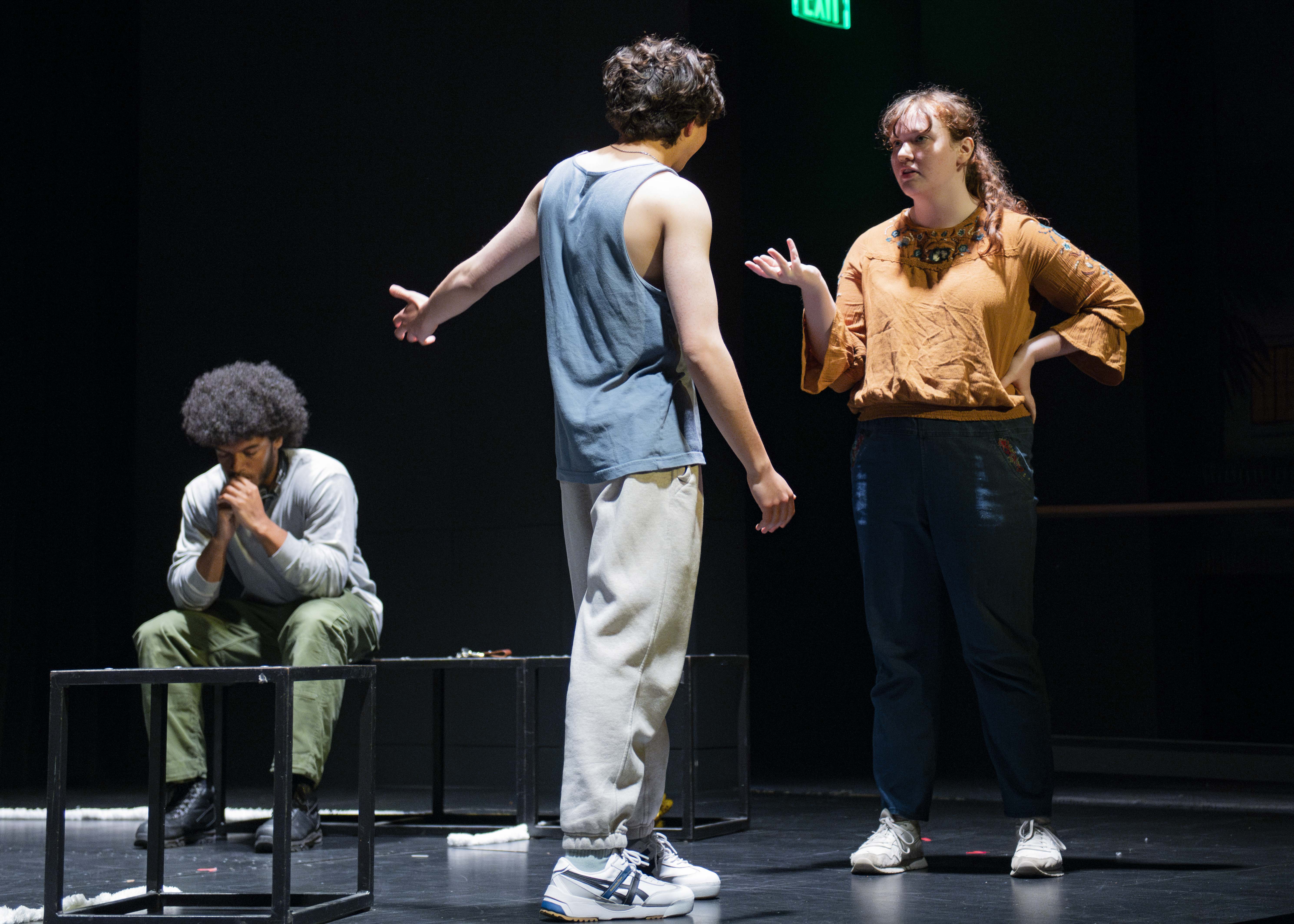Elaina Marino’s one-act play ‘Mockingbird’ delves into technological surveillance
Elaina Marino poses for a photo wearing an olive green shirt and brown jacket. The fourth-year theater student is premiering her play “Mockingbird” at UCLA’s School of Theater, Film and Television’s Undergraduate One Acts. (Max Zhang/Daily Bruin)
By Warren Riley
June 8, 2025 8:17 p.m.
Editor’s note: This post was updated June 18 at 3:40 p.m. to remove a photo of a production that was not “Mockingbird.”
As she rounds the corner to graduation, Elaina Marino is invoking the candor of the stage to tackle technological surveillance.
Marino, a fourth-year theater student, is premiering her play “Mockingbird” at the UCLA School of Theater, Film and Television’s Undergraduate One Acts. The show follows the story of a young American soldier whose life takes a sudden turn after accidentally leaking classified information regarding the war in Afghanistan. May 28 and 29, Marino joined her fellow graduating seniors and presented her original play concerning information, security and artificial intelligence.
While Marino brought an early draft of her script to the rehearsal room, she said her conversations with fellow TFT students led “Mockingbird” to become its fully realized form. During early table reads of the script, she said that one topic came up repeatedly in cast discussions – the modern implications of technology.
“All these conversations about the script blossom down into thoughts about surveillance,” Marino said. “As young people, none of us know the world before 9/11, before the Patriot Act, before surveillance and technology became such a big part of being an American.”
When she initially approached the writing process for her one-act play, Marino said she was inspired by the work of two women – Chelsea Manning, the prominent 2013 whistleblower, and Laurie Anderson, the performance artist behind the haunting 1981 single “O Superman.” After integrating her actors’ perspectives into her writing process, she was able to intensify the play’s themes, as each person brought their own relationship to the concept of being surveilled, Marino added. In order to produce a work of this nature, Marino said it was integral to work with a team of open-minded, discerning actors.
“(We have) people who are open to doing deep-text analysis,” Marino said. “We’re very thankful to have a group of people who were so open to this process.”
One such person is Noah Massabki, a second-year theater student playing the role of Andy in Marino’s play. Massabki said he was drawn to working with Marino during the audition process when he saw the strength of her script firsthand – a strength, he said, seen in the complexity of the play’s characters and the authenticity of its dialogue. The story deals directly with the moral dilemma of a potential whistle-blower, Massabki said. He added that his participation in the process has made him reconsider the power of information, a topic which he said is especially relevant today.
“The people with the most power in the play are the people who have the most information,” Massabki said. “Status is tied to what you know and what you don’t know.”
Massabki said embracing the role of Andy has been empowering – as it is a rare opportunity to originate a role. While the play concerns the implications of AI, Massabki said he finds a deeply human undercurrent to the script. He added that Cerulean Long, the play’s director and fourth-year theater student, has brought this undercurrent to life through their guidance.
“I think it’s fascinatingly staged,” Massabki said. “Its minimalist nature is very captivating. … I’m really excited for people to see it.”
Marino said that bringing technological themes to the stage would have been a difficult task if not for the work of third-year theater student, Fitz Freeby. Freeby said that she will be portraying an AI-inspired character named M. While Freeby has spent a great deal of time at UCLA playing characters with a personal authenticity, she said she now has the challenge of portraying the inauthenticity of artificial intelligence. Freeby added that she is using her studies in linguistic anthropology to focus on the appearance of AI-written language as it appears in the script.
“One thing I’ve been lucky enough to get into is the language of it (the script),” Freeby said. “Because my character is mostly a voice over the phone, it’s like learning or doing active research about what vocal qualities make people be like, ‘Oh, that’s a computer.’”

Freeby added that one of the many gifts of live theater is the ways in which an artist can physically appear in the space with their audience. She said that having M., an AI figure, as a physical presence in the theater, will change how an audience thinks about the impact of technological progress as a whole.
Marino said that her program at TFT and the student collaborators she has connected with have been integral to her work as a playwright. She said that she thinks of her relationships with her mentors and peers as a “trust fall” – that no matter what happens, her artistic community will catch her.
“The program and the people here at UCLA, … I trust the people here so much,” Marino said. “I don’t think I would be able to do this play without this type of group, and I don’t think I would have written it.”
